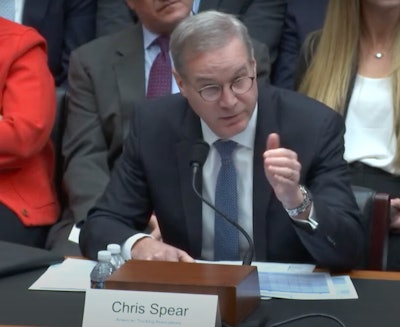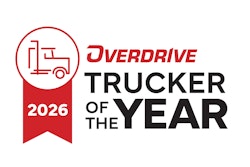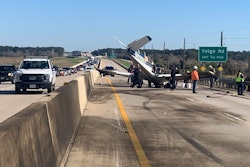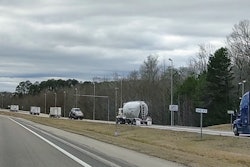
The latest iteration of the House Transportation and Infrastructure Committee met for the first time on Wednesday with the goal of hearing from transportation-related industries about the current state of transportation infrastructure and supply chain challenges.
There were five industry representatives at the hearing representing trucking, rail, ports, construction and labor unions. In the trucking corner was American Trucking Associations President and CEO Chris Spear.
Before you roll your eyes and close your browser, it’s worth noting that Spear actually championed some causes that are near and dear to owner-operators.
He, of course, spoke on behalf of ATA members, which are generally larger carriers, and as such, some of his statements cited the industry’s so-called “driver shortage” and how Congress can help address fleets’ recruiting issues.
But he also spent a lot of time talking about ways Congress can help reduce congestion on highways and improve truck parking. He also warned the committee about the dangers of legislation like California’s AB 5, which effectively banned the traditional leased owner-operator model in the state, as well as problems with the rush to “zero emissions,” such as in California.

[Related: Battery-electric's trucking reality -- parking problem could 'look a whole lot worse']
As history has proven, the goals and needs of ATA and larger fleets don’t always align with those of small fleets and owner-operators. But with the current issues the industry is facing, for Spear it well must feel like a good time for both sides of the industry to come together to advocate in unison for what needs to be done. A single-truck owner-operator or small fleet owner doesn’t have much in common with a mega fleet on paper, but where the rubber meets the road, there's no small amount of common ground -- all want to be profitable and get home safely, right?
I’ve summarized some of the relevant conversations between Spear and the representatives on the committee below. What do you think? Is ATA doing a better job of recognizing the interests of smaller carriers, or is this just one of the rare instances in trucking where prevailing concerns of large carriers happen to align with those of owner-operators?
[Related: Legal pressures, economic conditions for the new year ahead]
Congestion
Spear began his opening remarks talking about the $1.2 trillion 2021 Infrastructure Investment and Jobs Act (IIJA), also known as the Bipartisan Infrastructure Law (BIL), noting that even though the trucking industry makes up just 4% of vehicles on the nation’s roads, it “pays nearly half the tab into the federal Highway Trust Fund.” He urged the committee to make sure every dollar is "spent wisely.”
He said ATA objected to a December 2021-issued memo by the Federal Highway Administration that prioritized IIJA money to be spent on existing roads and bridges, rather than new construction. “Not only does this directly conflict with Congressional intent, it does nothing to address congestion, improve safety, and reduce emissions,” he said. He cited statistics that show the trucking industry loses nearly $75 billion a year, burning $34 billion worth of fuel, just sitting in congestion. “Funding existing infrastructure alone does nothing to fix congestion, it just makes it worse,” he added.
Spear cited the annual Top 100 Truck Bottlenecks list – the updated version of which will be released next week, he said – as a good starting point for determining which areas need the most attention to improve the movement of freight in the U.S.
[Related: G.W. Bridge remains the worst bottleneck in the U.S.]
Truck parking
Spear also mentioned truck parking in his opening remarks, noting that trucking needs “new, secure truck parking capacity as proposed by bipartisan Truck Parking Safety Improvement Act.”
He also answered questions from committee members in relation to truck parking needs. Rep. Mike Bost (R-Illinois) advocated for more truck parking, citing the shortage of parking as “clearly a major inefficiency in our supply chain.”
Spear noted that if members of the committee drive outside the Beltway, they would likely see trucks parked on on- and off-ramps rather than in secure, well-lit parking areas.
“Getting [truck drivers] safe, secure, well-lit parking is a no-brainer,” he said. Spear added that ATA will be “out there pounding marble; we’re going to be knocking on doors making certain this gets done. This is a necessity.”
He also cited that it’s an issue that has brought both sides of the proverbial aisle in trucking together, with ATA and the Owner-Operator Independent Drivers Association working together to send a joint letter to U.S. Transportation Secretary Pete Buttigieg asking the U.S. DOT for assistance in addressing the nationwide shortage of truck parking.
“That makes a statement,” Spear said. “We are in this together. This is an issue that impacts you, whether you are an owner-operator, an [independent contractor] or a full fleet. We all need more safe parking.”
[Related: How owner-operators can fight back in the war on truck parking]
AB 5
Rep. Scott Perry (R-Pennsylvania) asked Spear about California’s AB 5 independent contractor classification law and the impacts it is having on trucking in the state.
“Giving people the right to choose” the path they want to take in trucking “is what is in question here,” Spear said. “Stop talking to the media and start talking to independent contractors. They’ll tell you why they choose this path. Whatever the reason may be, that’s their decision, their choice.”
He added that in most cases in trucking, drivers aren’t forced into being independent contractors by an employer looking to avoid paying benefits or other scenarios. “I’m not saying there isn’t abuse, but to reform entire state law or national law based on an anecdote ... just talk to the ICs. They’ll tell you this is a wonderful profession, a business they want to grow. They want to add trucks and drivers underneath them serving other companies. Give them that option, don’t take it away.”
And for those such as ATA who believe there is a "driver shortage" -- Spear put the current driver deficit at 78,000 -- he told the committee that putting up barriers to independent contractor relationships will only make that problem worse and will drive up the costs of everyday goods even more.
Perry also mentioned the Department of Labor’s recent proposed rule, which much of the trucking industry is opposed to, asking what kind of impacts it would have.
“Any state like California that adopts AB 5 as a model, you’re going to have an inability to move freight from those ports to the rest of the country,” Spear said. “I have companies that are simply dependent on this model [that] cannot operate, cannot comply with the rules of AB 5. They’re going to pull out, simply not operate in California.”
[Related: California Trucking Association again seeks injunction to block AB 5]
Spear also noted that there is “no enforcement mechanism” for AB 5 in California, though other reports suggest otherwise, via California's Department of Industrial Relations' audit activity.
Spear is correct that, most often, particularly when it comes to the large carriers in his constituency with big pockets and big targets on their backs, “it’s done by the plaintiff’s bar. That’s by design. They’re going to litigate us, and then the unions are going to come in and try to organize them. That’s what’s behind this.”
Greg Regan, President of the Transportation Trades Department for the American Federation of Labor and Congress of Industrial Organizations (AFL-CIO) rebutted Spear’s comments about AB 5.
“What AB 5 does is it simply provides clear definition for what is an employee and what is not,” he said. “It does not eliminate the independent contractor method because there are plenty of ways for someone to do outside work and clearly demonstrate they’re independent contractors, nor does it require anyone to join a union.”
[Related: Remaining legal challenges to AB 5 'an uphill climb,' enforcement light thus far]
Rep. Doug LaMalfa (R-California) cited a recent op-ed published by Fox News penned by Prime Inc.-leased owner-operator Theldorine “Dee” Sova, formerly based in California. Since AB 5, she has moved to Missouri. Sova, also a former ATA America’s Road Team Captain, wrote about how AB 5 forced her to pack up and move, or lose her business. “AB5 would have demoted me from small business owner to company employee -- affecting my hours, benefits, flexibility and overall ability to earn on my own terms,” she wrote. “It would effectively kill the dream I worked so hard to build over so many years.”
Spear, who has known Sova through her time as an America’s Road Team Captain, told LaMalfa her story is “one of many,” adding that “she chose her reason” to be an independent contractor.
When asked if ATA has received any guidance from California in how to deal with the AB 5 requirements, he said simply, “Get a lawyer.”
[Related: Trucking groups, owner-ops generally opposed to Biden DOL's contractor rule changes]
Electrification
Another topic Spear focused on in his opening remarks was the nation’s push toward electric-drive so-called “zero-emission” vehicles. He noted there needs to be “realistic discussion” about energy and environmental policies in the U.S., adding that it’s “not a matter of if we get to zero, but when. And we will get there, just not on the timelines being proposed in California.”
He added that the state’s “rush to zero makes their timeline and targets unachievable, and they will fail.”
Spear was referencing California’s effort to transition to “zero-emission” vehicles over the next couple of decades, including 100% zero-emission drayage, last-mile delivery and government fleets by 2035; 100% zero-emission refuse trucks by 2040; and 100% zero-emission everywhere else, where feasible, by 2045.
“The rare minerals needed for millions of 5,000-pound truck batteries, the infrastructure needed to charge them, and the additional electricity needed to power our trucks full scale doesn’t yet exist, and won’t any time soon,” he added. “We’re committed to a cleaner environment -- we’ve proven that. We simply ask that we be realistic about the path forward.”
Spear cited a recent American Transportation Research Institute report that found that, despite only accounting for 4% of vehicles on the road, trucking would consume 40% of all power currently generated to charge the full fleet of trucks in the U.S.
“Markets reflect reality and these timelines we’re facing don’t,” he said. “When we get to these timelines, like California -- 2035 -- that’s 12 years away. It’s going to fail, it’s going to be embarrassing, they’re going to be issuing all these exemptions because they rushed to zero and didn’t take into account all these realities.”
[Related: Operators' top 2022 concerns drown out fleets still worried over a 'driver shortage']










